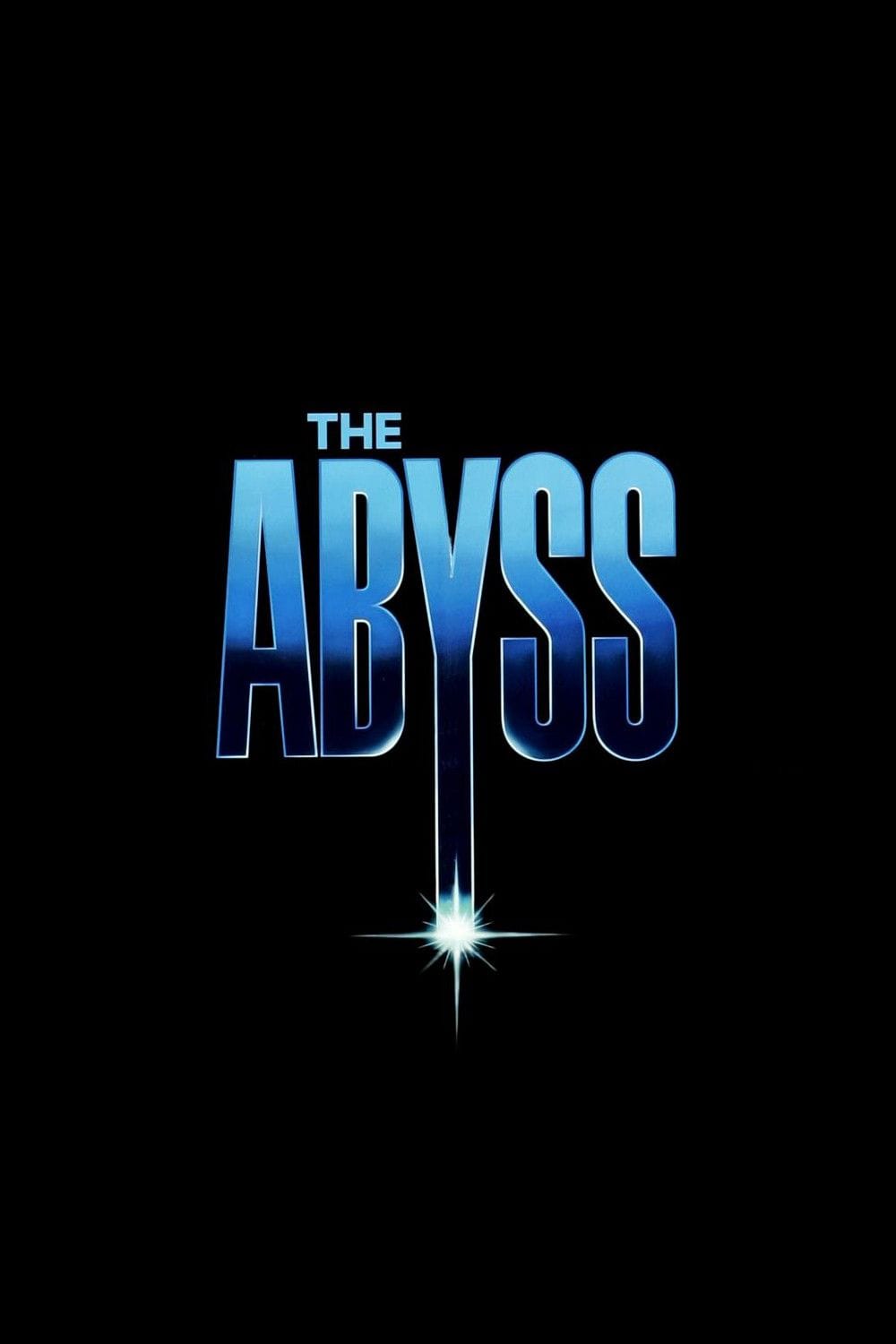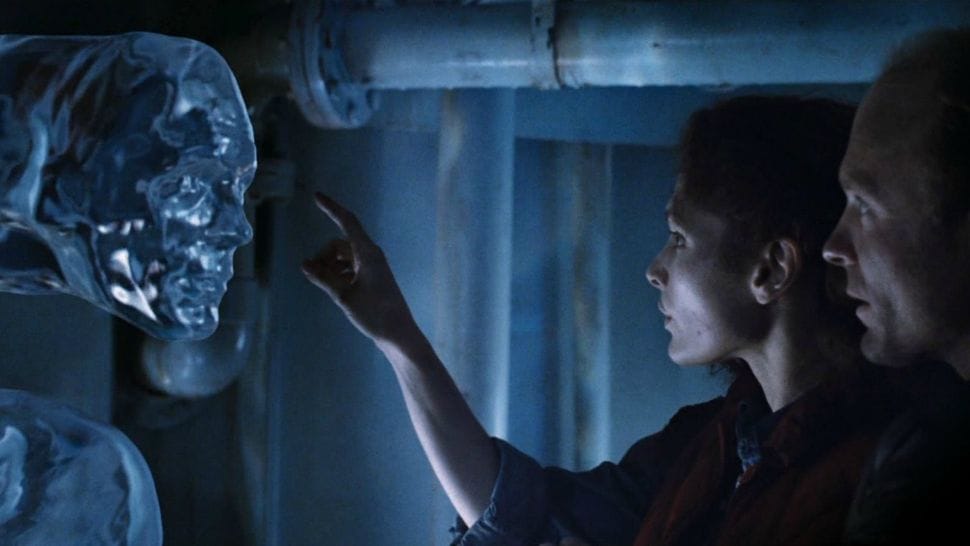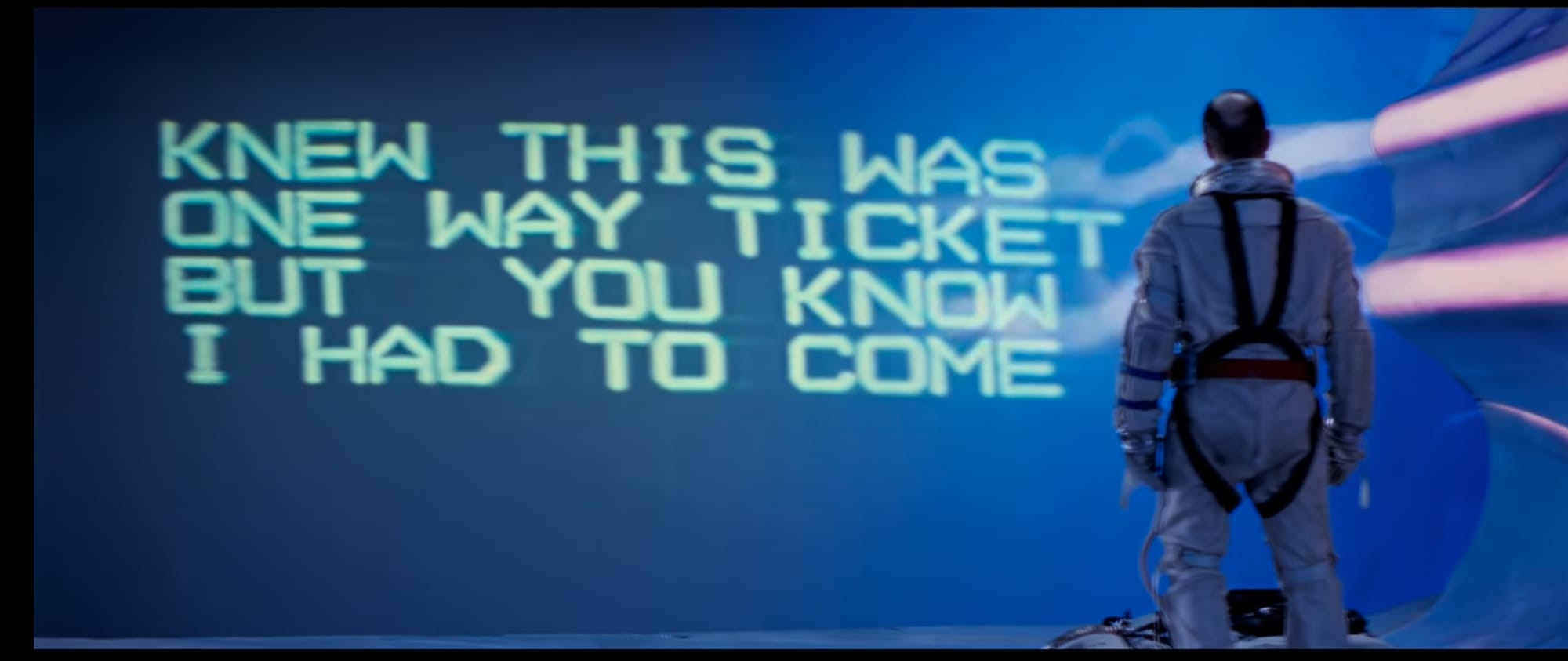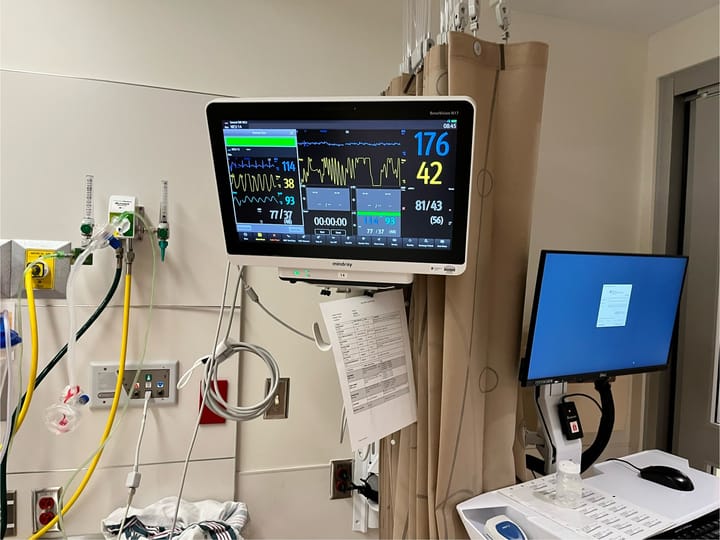Lessons from the Abyss

I recently watched James Cameron’s 1989 insane underwater adventure film, The Abyss, and my brother in law is dead from cancer.
This is a stupid way to start a blog post, and if I thought more than 10 people might end up reading it, I might try to improve on it. Instead, I’ll just dive in.
Let’s start with the first part of that. Between his work in the Terminator and Alien franchises, as well as his recent obsession with a distant planet filled with blue humanoid creatures that feels as real as any other fictional place like Middle Earth or Canada, nobody really thinks of The Abyss when they think of James Cameron sci-fi.
And thanks to the movie about the big boat sinking… nobody really thinks about The Abyss when you think of James Cameron ocean movies.
And that’s a shame. Because it’s kind of incredible. Not kind of. It is. The making of this movie (that revolves around an American submarine sunk with nuclear missiles aboard, and the attempt by a group of submersible pilots and divers to retrieve it before the Russians can, all while dealing with some kind of alien force that lives deep within the aforementioned abyss), is unreal and probably should have gotten Cameron put on trial the same way Galileo was when he insisted the planets orbited the sun. He was right to do it, but it still might warrant punishment from God.
It’s a massive technological achievement, a true instance of a master dedicated to making his vision come to life. But it’s also a very human story. It’s main character is played by Ed Harris, maybe in his greatest performance, as the expeditions leader challenged with keeping his crew safe, managing the egos of the SEALs on board, dealing with the idea of intelligent life found in the depths, all while him and his ex wife (Mary Elizabeth Mastrantonio) clash with each other and their feelings at every turn within the confined space of an underwater vehicle.

It has all that, plus all the other things that made a movie great in the 80s. Soviet and nuclear induced paranoia, Michael Biehn, and a required viewing of the Director’s Cut that clocks in at just under 3 hours.
Spoilers, but the climax features Ed Harris outfitting himself in an experimental dive suit filled with liquid, which should allow him to travel down into the abyss, disarm a nuclear missile, and protect a race of sentient shape shifting mermaids made of light. It’s nuts.
In short, I love this movie.
Oh right, the second part of that opener.
My wife is one of three sisters. All attended Texas A&M and all married Aggies, the way God intended (because he knew we needed to be contained). The youngest (Mallory) has been married less than a year, and it’s been a very hard year. Not just in the typical early stages of marriage either, where you fight about stupid things like who’s parents you’re seeing first on Christmas or which cabinets the plates should go in.
When Mallory got engaged in the Summer of 2022, she probably imagined her most stressful day would be paying the flower bill. But a few months later, things changed intensely. Her fiancée, Garrett, went to the ER after dealing with headaches and issues stemming from his nervous system. A scan would reveal a decent sized tumor in his skull, surgeries and biopsies would indicate the potential for malignancy, and radiation and chemo would alter everything about their lives for the next few months.
They persevered, and were married (once in a private ceremony following a very difficult stretch for Garrett and a second time when he had recovered a couple of months later). It’s been beautiful in its own way to watch them face this challenge head on, and refuse to walk away from one another when many others would have folded.
It’s also been a nightmare. Watching every positive step met with bad news a month later. Every mountain top reached in the recovery process followed by the deepest abyss you’ve ever seen, all culminating into a Memorial Day Weekend that would eventually become his last.
When something like that happens (a young, fit person in your family circle being handed a death sentence), you realize how close we are to that abyss at all times. This dark suffering place, that drags down not only those it intends to keep, but also those who are just along for the ride. Those who will be spat back out in the end and left to wonder what all this was for.
It leads you to WWE sized wrestling matches with God, whatever your belief or non-belief of him is. Questions you thought you answered for yourself long ago arise from the depths of the abyss, and you have to reevaluate them now that the worst has happened to someone you know.
I am not really a “everything happens for a reason” person. I think that can be a dangerous and unhelpful assumption to lob at people who have their heads down crying, and you shouldn’t be upset if they hurl it back at you with a lot more venom attached. That said, bad things happen to everyone, all the time, every day. And the only way I know to go forward, out of the abyss and into the light, is to find something to take away from it all. And if you can take those lessons, and combine them with a James Cameron movie, shouldn't you do it?
It’s Not About You
In the movie, Ed Harris’ character ventures down in his diving suit, and it becomes clear as he reaches the bottom and lets his crew know he doesn’t have enough air, that this was his plan all along. “A one way ticket” as he describes it. And he does it, subjecting himself to aloneness and darkness and mounting pressure, because he has to disarm the nuclear missile, to save those he cares for, and the alien species he’s never met. He does it, because it’s not about him.
Most people are not so selfish as to immediately hear somebody else’s cancer diagnosis and wonder how it affects them. But most people will get there eventually. You spend enough time in the abyss, you start asking questions. How long do I have to stay here? How do I explain this to my kids? Is there any way to get myself some comfort?
These thoughts don’t make you a bad person, they make you normal. What makes you something more than that, is how you push forward. Remind yourself that the abyss is not permanent for you. Something greater is at play, the lives of others you care about will be forever altered down here, and not everybody in this expedition gets to come back to the surface.
Before he succumbs to the depths, Ed Harris gets rescued by his little aquatic angel beings, and that’s really special. There is no such ending for Garrett. There are miracles out there, we experienced some often during our time in the depths, but most people will never be brought out of the void and back into this world. There is somewhere else for them to call home.
So you take your complaining, and your longing for the days before you knew what a glioblastoma was, or your fears for the future, and you put them away. You shove them deep down inside the very depths of yourself, and you smile for those that need it and if you can’t be helpful you should be quiet.
Because the abyss is not about you. It never has been. It’s about saving who you can, while you can. Keeping those around you connected to home base, being an anchor for one person and a life raft for someone else.
People at their Worst Deserve the Best You Can Do
Just because you’ve put on a brave face and are trying not to make things worse, doesn’t mean everybody else is. There will be people with you in the abyss that don’t handle it well. The pressure will get to them, the darkness will blind them, and they will lash out.
Michael Bien’s character in the movie cannot handle everything that occurs within the sunken submersible. The fear of Russian submarines, newly discovered life forms, and actual pressure sickness make him erratic and dangerous. It leads to what can only be described as a slow submarine chase between him and Ed Harris, where they wreck and Michael Bien is killed. Again, it’s an insane movie, I love it very much.
It’s probably not going to get that crazy for you down here. It might, depending on the people you surround yourself with and your access to nuclear armaments, but probably not.
Still, you might find yourself shocked at what people will quibble about down in the depths. The decisions people make may anger you, or disappoint you. You may hear words from people you never dreamed they would say.
“That’s not what I would have done…” Well it’s not about you. We established that already.
Down here, where feelings are amplified and heartbreak is constant, remember that most of us will climb out of here eventually, and no one wants to be remembered for what they were like in the abyss.
In the film, during Ed Harris’s descent, he is connected and able to hear from his crew. They put on his ex-wife, Mary Elizabeth Mastrantonio, to keep him focused on his task and keep him from losing consciousness. She is open and vulnerable and loving with him through the radio, something that is uncomfortable for her, a character that puts on a front of hard nosed and iciness. But she does it anyway, because he deserves the best she can give him in that moment.
Garrett was good about this. If you can believe it, my coping mechanism for situations like these is usually just to try to be funny. Shouldn't be surprising, I’m literally writing about his death and including an ode to a 1980s film about submarines. That’s just my level of emotional maturity.
Not everyone is okay with that, but Garrett always was. I could make a joke about him needing a new barber when his hair grew back odd and patchy after multiple surgeries and chemo sessions. And he would give it right back, stopping mid conversation with me and pretending he didn’t know what was happening, then laughing when my eyes got wide and I leaned in with concern for him.
I appreciated that then and still do now, and I tried to show that grace to everyone around me at a time when grace is at a premium.
Someone is Always Watching
So Ed Harris gets saved by the ocean ETs, but they don’t take him back to the surface immediately. They bring him to their base, where they show him clips of the world going mad over the lost sub and nukes, pressing forward towards the brink of annihilation. The creatures then show him tidal waves that they are sending out into the world to destroy humanity, but they stop them short of their targets, and mankind lives on. Why? Because they see the last message Harris has left for his wife.
That he knew he was going towards his death, but he had to do it anyway, and that he loves her.

He didn’t know that bit of vulnerability and kind words would be what saves the world. And chances are, nothing you do in the abyss will do anything of that nature.
But people are watching you. Family, acquaintances, your own kids, total strangers… they are watching more than you know. Garrett and Mallory’s story has touched a lot of peoples lives in various ways, and part of that is because of the strength they showed down here where things are bad. What we do down here in the crushing void matters, and how else can we make it back to the surface if not looking to one another and taking some strength from that?
What purpose does our time down here serve if not to demonstrate to others what they are capable of handling? How much better can the world be if everyone can see us down here, relying on each other and our faith when there seems to be no reason to at all? Maybe our time in darkness can actually make the surface a better place, and if it can… shouldn’t we try?
I don’t think Garrett ever saw The Abyss. I don’t even know if he would have liked it. I never got to ask, because I didn’t know him long enough. It’s on a long list of things he never got to do during his short time on the ground with us, and the list of things I’ll never get to talk to him about.
The cruel joke of the guy who treated everyone like they were the most important person on the planet, who saved his money, who exercised and ate right, who volunteered and gave of himself frequently… this is the one that gets plucked early, leaving us to wonder why we are allowed to come back up to the surface. All of us undeserving and unworthy, or at least no different from him, condemned to rise back up unimpaired but forever changed by the events of the abyss.
It makes no sense, but it never seemed to bother him. He took the cup and drank from it, he journeyed deep into the bottom of the trench and never asked why. A one way ticket for him alone, leaving behind a widow, family, friends, and a lasting impression on my son, his 4 year old nephew.
We will climb our way out of this abyss. Mallory will not be down long. She is strong, and prepared, and wrapped up in a community of people that will not see her fail. The world is a worse place without Garrett in it, but we will remain in it, striving to make it better because that is what we are meant to do.
And when the time inevitably comes for us to again journey down where the water is cold and inky black, we will remember what we learned this time around. We will not cave to the pressure, we will not be afraid. We’ll remember the things that Garrett and James Cameron taught us, and we will be content to know that one way or another, we will see the sunlight again.



